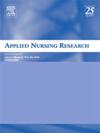The association of depression, anxiety, stress, and quality of life with the presence or absence of chronic obstructive pulmonary disease in lung cancer patients
IF 2.2
4区 医学
Q1 NURSING
引用次数: 0
Abstract
Aim
This study examines the association between mental health symptoms (depression, anxiety, and stress) and quality of life (QoL) in lung cancer patients, stratified by the presence or absence of chronic obstructive pulmonary disease (COPD). It also identified predictors of physical and mental QoL.
Background
Lung cancer and COPD frequently coexist due to shared risk factors, such as smoking, which compounds physical and psychological burdens. Despite this, limited research has explored how this comorbidity affects mental health and QoL.
Methods
This cross-sectional study included 456 hospitalized lung cancer patients, of whom 235 had COPD. Depression, anxiety, and stress were assessed using the DASS-21, while QoL was measured using the SF-12. Multiple regression analyses were conducted to identify predictors of QoL.
Results
Patients with COPD reported significantly higher levels of depression, anxiety, and stress (p < .05). Stress was a significant negative predictor of physical QoL (adjusted R2: 0.103, p < .001), while COPD and anxiety significantly negatively predicted mental QoL (adjusted R2: 0.128, p < .001).
Conclusions
COPD exacerbates psychological distress and worsens QoL in lung cancer patients. Stress and anxiety significantly impair physical and mental QoL, underscoring the need for integrated care.
Implications for practice
Holistic care approaches that address stress and anxiety, promote smoking cessation, and provide personalized treatments are essential for improving QoL and outcomes in this vulnerable population.
肺癌患者抑郁、焦虑、压力和生活质量与慢性阻塞性肺疾病存在与否的关系
目的本研究探讨肺癌患者心理健康症状(抑郁、焦虑和压力)与生活质量(QoL)之间的关系,并根据是否存在慢性阻塞性肺疾病(COPD)进行分层。它还确定了身体和精神生活质量的预测因素。肺癌和慢性阻塞性肺病经常共存,这是由于共同的危险因素,如吸烟,这加重了身体和心理负担。尽管如此,有限的研究探讨了这种合并症如何影响心理健康和生活质量。方法本横断面研究纳入456例住院肺癌患者,其中235例患有COPD。抑郁、焦虑和压力用DASS-21进行评估,生活质量用SF-12进行测量。采用多元回归分析确定生活质量的预测因素。结果COPD患者报告的抑郁、焦虑和压力水平显著升高(p <;. 05)。应激是生理生活质量的显著负向预测因子(调整R2: 0.103, p <;.001),而COPD和焦虑显著负向预测精神生活质量(调整R2: 0.128, p <;措施)。结论copd加重了肺癌患者的心理困扰,加重了患者的生活质量。压力和焦虑显著损害身体和精神生活质量,强调需要综合护理。对实践的启示解决压力和焦虑、促进戒烟和提供个性化治疗的整体护理方法对于改善弱势群体的生活质量和结果至关重要。
本文章由计算机程序翻译,如有差异,请以英文原文为准。
求助全文
约1分钟内获得全文
求助全文
来源期刊

Applied Nursing Research
医学-护理
CiteScore
4.50
自引率
0.00%
发文量
65
审稿时长
70 days
期刊介绍:
Applied Nursing Research presents original, peer-reviewed research findings clearly and directly for clinical applications in all nursing specialties. Regular features include "Ask the Experts," research briefs, clinical methods, book reviews, news and announcements, and an editorial section. Applied Nursing Research covers such areas as pain management, patient education, discharge planning, nursing diagnosis, job stress in nursing, nursing influence on length of hospital stay, and nurse/physician collaboration.
 求助内容:
求助内容: 应助结果提醒方式:
应助结果提醒方式:


